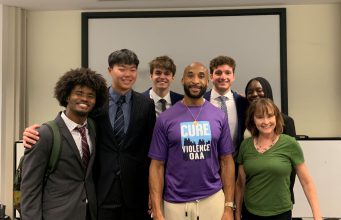Finance is a diverse field, spanning everything from investment banking, to corporate finance, to real estate. At Goizueta, our students succeed in all aspects of the financial world due to a comprehensive approach that combines financial theories, experiential options and real-world interaction with business. Finance is the most common discipline entered by graduates, with recruiters lauding our students’ abilities in this field time and again.
Goizueta is also proud of being named one of the nation’s “top 10 schools for employability in banking” and ranked No. 1 in the Southeast.
The school benefits from being forward-thinking in our research, which encourages us to be innovative in our efforts, all of which impacts students and their careers. A perfect example is the Emory Center for Alternative Investments, started in 2008. A new chapter in alternative asset study, the center leverages our international distinction of top finance faculty with valuable research and brings together industry, students and faculty in compelling ways.
[youtube ssl86L4mdQ8]
Financial economics encompasses micro-investment theory, economics of uncertainty, the role of financial markets and institutions, the regulation of financial products, firms and markets, the theory of the firm, and corporate governance. The field is unique among the social sciences in that it has had a direct and significant influence on practice: The impact of the efficient market hypothesis, portfolio selection, risk analysis, and contingent-claim pricing on capital budgeting and money management is clearly evident. This impact is based both on developments of theory and on empirical tests of hypotheses that are made feasible by a large and increasingly accessible body of relevant data.
The Finance faculty includes leading researchers in their respective areas, publishing in such notable journals as the Journal of Finance, Review of Financial Studies, Journal of Business, Journal of Financial Economics, Financial Management, and Journal of Accounting and Economics. Faculty members are involved in a number of national organizations, serving as consultants, collaborating with research, and holding corporate board memberships.









